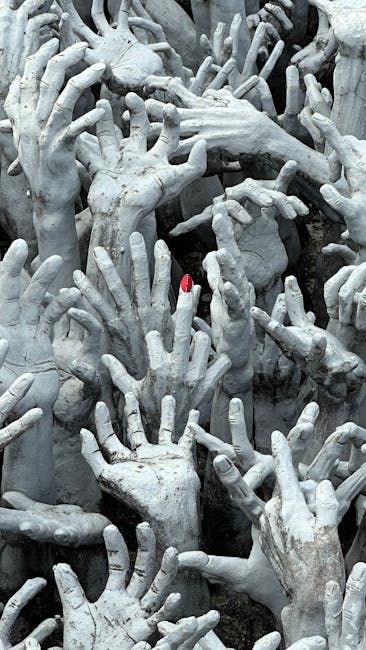Thai Superstitions: Unveiling the Beliefs That Shape Daily Life

Thai Superstitions: Unveiling the Beliefs That Shape Daily Life
Hey there! Have you ever stumbled upon a cultural quirk that just made you stop and think, "Wow, that's...different?" Well, buckle up, because today we're diving headfirst into the fascinating world of Thai superstitions! I've spent a fair bit of time in Thailand, and let me tell you, these beliefs aren't just old wives' tales; they're woven into the very fabric of daily life. It's like a hidden set of rules guiding everything from what you wear to how you build a house. So, grab a cup of something delicious, and let's explore this enchanting world together!
Spirits Are Everywhere: Understanding Phi

One of the first things you'll notice in Thailand is the deep respect for spirits. The concept of "Phi," or ghosts and spirits, is incredibly pervasive. These aren't necessarily scary, malevolent entities (though some are!). Think of them more like invisible neighbors, sometimes helpful, sometimes mischievous, and always deserving of respect. It's like having a whole other dimension coexisting with our own.
Respecting the spirit world is paramount in Thailand. This can manifest in many ways. You'll see spirit houses, miniature shrines, outside homes and businesses. These aren't just decorative; they're residences for the guardian spirits of the land. People leave offerings of food, drinks, and flowers to appease them and ensure good fortune. Ignoring these spirits is considered incredibly bad luck!
I remember once, I accidentally stepped over the threshold of a friend's house without acknowledging the spirit house. My friend gently, but firmly, reminded me to "wai" (a slight bow with hands pressed together) towards it to show respect. It wasn't a scolding, but more of a friendly correction, highlighting the importance of acknowledging the spirits.
Lucky Numbers and Auspicious Colors

Numbers and colors hold immense significance in Thai culture, far beyond mere aesthetics. Some are considered incredibly lucky, while others are to be avoided at all costs! It's a bit like playing a game of chance, but with your life.
The number 9 is perhaps the most auspicious. It's pronounced "gao," which sounds similar to the Thai word for "step forward" or "progress." Therefore, it symbolizes advancement, success, and long life. You'll often see it in phone numbers, license plates, and even addresses. People are willing to pay a premium to have a number 9 in their lives!
Conversely, the number 13 is generally considered unlucky, just like in many Western cultures. However, other numbers can carry negative connotations depending on the context. For example, the number 6 can sometimes be associated with hard work and hardship, so while it's not universally bad, it's not as enthusiastically embraced as number 9.
Colors are just as important. Yellow is associated with royalty and is considered a very auspicious color, especially for Mondays. Each day of the week has its own associated color, originating from Hindu astrology. Wearing the correct color on the corresponding day is believed to bring good luck. For instance, Tuesday is pink, Wednesday is green, Thursday is orange, Friday is blue, Saturday is purple, and Sunday is red.
I once saw a colleague deliberately choose a blue shirt for a big presentation on a Friday. He casually mentioned he was "playing the odds" for success. While I don't know if the shirt directly influenced the outcome, he certainly felt more confident! It's this quiet belief, woven into everyday choices, that makes these superstitions so captivating.
Hair Today, Gone Tomorrow: Haircuts and Superstition

Even something as mundane as a haircut can be laden with superstition in Thailand. Certain days are considered unlucky for haircuts, while others are particularly auspicious.
Generally, it's considered unlucky to get a haircut on Wednesdays. This is because Wednesday is traditionally a day for students to shave their heads as a form of respect for their teachers. Getting a haircut on this day is seen as disrespectful and could bring bad luck. Moreover, cutting your hair during the Buddhist Lent period is also frowned upon.
However, certain days are believed to be particularly lucky for a trim. For example, getting a haircut on a Monday is considered good for health, while a Friday haircut is said to bring good fortune. The best way to ensure you are not choosing a bad day is to consult a Thai Lunar calendar which would provide a detailed list of auspicious and inauspicious days for specific activities.
I remember my friend Panida once postponing a crucial job interview because she realized she had scheduled a haircut for the day before. She rescheduled both the haircut and the interview, explaining that a bad haircut day might negatively influence the interviewer's perception. To her, it was simply not worth the risk!
Building a Home: Auspicious Beginnings and Placement

Building a new home in Thailand is a serious undertaking, filled with rituals and superstitions aimed at ensuring prosperity and harmony for the occupants. It's not just about bricks and mortar; it's about creating a sacred space.
The most important thing is to choose an auspicious date for starting construction. This usually involves consulting a monk or astrologer who can determine the most favorable time based on the homeowner's birthdate and astrological charts. This date is believed to set the tone for the entire project and the future of the family in the home.
The direction the house faces is also crucial. Generally, facing north is considered auspicious, bringing wealth and success. Facing south is generally not preferred, but there are exceptions depending on the homeowner's birthdate and other astrological factors.
The placement of the first pillar (เสาเอก – Sao Aek) is a significant ceremony. It's typically blessed by a monk, and offerings are made to the earth spirits to ensure their goodwill and protection. The pillar is often adorned with flowers and colored cloth. Even the type of wood used for the pillars can be important, with certain types being preferred for their strength and auspicious properties.
I once witnessed a Sao Aek ceremony. The atmosphere was incredibly solemn and respectful. Monks chanted prayers, and the entire community participated. It was a beautiful illustration of how deeply ingrained these beliefs are in Thai society.
Dreams and Their Meanings: Deciphering the Subconscious

Dreams are often seen as messages from the spirit world, offering insights into the future or providing guidance. Dream interpretation is a common practice, and there are specific meanings associated with different dream symbols. Think of it as a personalized fortune-telling system playing out in your sleep.
Dreaming of snakes is often interpreted as a sign of upcoming romance or potential danger, depending on the context of the dream. Dreaming of teeth falling out can symbolize the death of a relative or close friend. Seeing monks in your dream is generally considered very lucky and a sign of blessings to come. On the other hand, dreaming of blood is generally bad luck.
There are entire books and websites dedicated to Thai dream interpretation. People take these interpretations seriously, sometimes making decisions based on what they've dreamt. Lottery numbers are also frequently chosen based on the perceived meaning of dreams. It's not unusual to hear someone say, "I dreamt of three elephants last night, so I'm betting on 33 today!"
I know a friend who swore she won the lottery after dreaming of a specific temple. She took the dream as a sign and bought tickets with numbers related to the temple's address. Whether it was coincidence or divine intervention, she became a firm believer in the power of dreams after that!
Superstitions Around Pregnancy and Birth

Pregnancy and childbirth are surrounded by a host of superstitions and rituals, aimed at protecting the mother and child from harm and ensuring a healthy and prosperous future. It's a time of heightened vulnerability, making these beliefs even more potent.
Pregnant women are often advised to avoid certain activities, such as attending funerals or weddings, as these events are believed to bring bad luck or attract negative energies. They are also discouraged from sewing or knitting, as it's believed to cause the umbilical cord to wrap around the baby's neck.
Certain foods are also considered taboo during pregnancy. For example, eating mangoes is thought to cause the baby to have sticky skin, while eating bananas might make the baby lazy. These dietary restrictions vary depending on the region and family traditions.
After the baby is born, a traditional ceremony called "Yu Duan" is performed to purify the mother and child and protect them from evil spirits. This often involves bathing the baby in water infused with herbs and chanting protective prayers.
I remember attending a Yu Duan ceremony for a friend's newborn. The entire event was filled with love, warmth, and a deep sense of tradition. It was a powerful reminder of the importance of community and faith in Thai culture.
General Dos and Don'ts: Navigating Daily Life

Beyond the specific examples, there are countless other superstitions that influence daily life in Thailand. These are often subtle and ingrained in the culture, making them easy to overlook.
Here are a few common ones:
- Don't whistle at night: It's believed to attract evil spirits.
- Don't cut your nails at night: It's considered bad luck.
- Don't point your feet at people or religious images: The feet are considered the lowest and dirtiest part of the body, so pointing them is disrespectful.
- Always remove your shoes before entering a temple or someone's home: This is a sign of respect.
- Don't touch someone's head: The head is considered the most sacred part of the body, so touching it is disrespectful unless you have permission.
There are also some common "dos" that are always good to keep in mind:
- Always show respect for elders and monks: This is a cornerstone of Thai culture.
- Be mindful of your tone of voice: Raising your voice is considered rude and aggressive.
- Dress modestly when visiting temples: Cover your shoulders and knees.
- Accept food and drinks graciously when offered: It's a sign of hospitality.
- Smile! Thailand is known as the "Land of Smiles" for a reason.
I once accidentally pointed my feet at a Buddha image in a temple. An elderly woman gently corrected me with a kind smile, explaining the significance. It was a humbling reminder of the importance of cultural sensitivity and respect.
Modern Thailand and Enduring Beliefs

Even in modern, cosmopolitan Thailand, these superstitions persist. They're not seen as backward or outdated, but rather as a connection to the past and a way to maintain harmony with the spiritual world. It's a fascinating blend of tradition and modernity.
While some may dismiss them as mere folklore, these beliefs offer a glimpse into the Thai worldview, emphasizing respect, balance, and a deep connection to the supernatural. They shape daily decisions, influence social interactions, and contribute to the unique cultural identity of Thailand.
So, the next time you're in Thailand, keep an eye out for these subtle cues and cultural nuances. Embrace the superstitions, learn from them, and you'll gain a deeper appreciation for the richness and complexity of Thai culture. And remember, a little respect for the spirits never hurts!
Thanks for joining me on this journey into the world of Thai superstitions. I hope you found it as fascinating as I do! Until next time, happy travels (and watch where you point your feet!).
Post a Comment